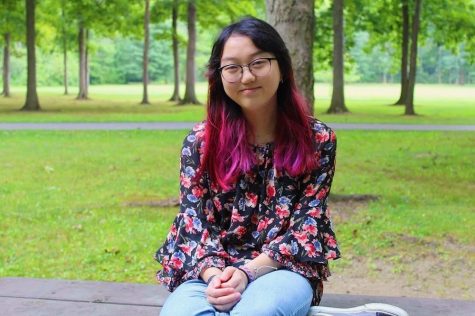Students take CCP health, English classes for college credit
Official Lakeland Community College website
To complete a Lakeland CCP course, students can drive to their campus in Kirtland, take the class online, or take the class at Mayfield if it’s taught by one of the high school teachers.
October 29, 2021
Students at Mayfield are offered the opportunity to participate in the College Credit Plus (CCP) program and many have taken advantage of this.
This CCP program allows students to take college-level courses and receive both high school and college credits. Many of these courses are offered by community colleges around the area. Here at Mayfield, both Lakeland Community College and Cuyahoga Community College provide CCP courses.
Senior guidance counselor Pamela Bobinski, describes the CCP program as a way to get ahead for more ambitious students. She said, “You can start and honestly could even earn an Associate’s degree before you finish high school if you plan and map things out.”
Bobinski believes that this program is a great opportunity for students who don’t want to take AP classes or just aren’t sure about them. She said, “I think if students are looking to take on a different challenge, I think it would be a great opportunity to compare what works best, CCP classes or AP classes, for long-term planning. So even sophomore year, exploring AP World or AP Bio and then another CCP course during the summer, it would complement graduation requirements.”
Junior Katie Leskovec is currently a student in CCP English Composition I through Lakeland and thinks the CCP program is a really interesting idea. She said, “In AP classes, it’s like a college curriculum in a high school form, but this is like a college curriculum in a college form and you can actually take college courses with college students and professors.”
Although this English class is Leskovec’s only CCP course this semester, she hopes to take more at Lakeland Community College’s actual campus her senior year.
Because these classes are college-level courses, Leskovec definitely noticed some differences between her CCP class and her other high school classes. She said, “It’s pretty fast-paced and it’s not like, ‘We just finished a unit, we’re going to take a break day.’ It’s more like, ‘We finished a unit, now it’s time for the next essay.’ So, it’s very content heavy but that’s also nice to be constantly doing something.”
Senior Lily Compton is also taking CCP English Composition I and likes the more challenging aspect of the college course. “I have always been good at English, and it’s just been a class that is too easy for me; so, I thought that taking college-level English would be a good challenge and prepare me for when I do leave for college,” she said.
Compton has noticed a significant increase in pressure when it comes to this class. She said, “You worry more about deadlines, and you have pages of an essay to write in only a week and it can become more stressful. However, you get to work a lot by yourself, so it is easier to focus; and, you do not really have to sit through a lecture from the teacher.”
These CCP classes require more time outside of class to work on assignments, according to Leskovec. She said, “At the beginning of the year, [English teacher Nick Somich] told us that it’s usually two hours of homework for an hour of classroom time. It’s manageable, but it’s definitely more work.”
CCP teachers like Somich need at least a Master’s degree in the subject area to be hired by Lakeland or Cuyahoga Community College in order to teach these classes. Other than Leskovec and Compton’s English class, Mayfield also offers a few other classes including English Composition II and Health. Bobinski said, “They just added English Composition II this year, so who knows what’ll come next.”
The registration process for this program starts with a letter of intent signed by both the student and their guardian. Bobinski said, “[This letter shows they] understand all of the details and pieces and parts that go into being a CCP student and the responsibilities, especially financial responsibilities, on the family if the student is not successful in the course.”
According to Bobinski, students will then apply and take an entrance exam called the Accuplacer which gives the college an understanding of what level the applying student is at regarding their English and Math skills. “After taking that test, once you get accepted, there is a registration form that needs to be completed for every course every semester. Then you have to check your college portal just to make sure you gain access and understand how to access the materials, how to communicate with the professor, and responsibilities on the college end of things,” Bobinski said.
Overall, Bobinski believes students should look into the CCP program if they’re ready to take on a challenge. She said, “I was a student of the College Credit Plus program in high school myself, and it was a great transition for me that I needed. I think if a student is ready to be responsible and ready to check-in, whether it be remotely and online, or attending in-person on a college campus, I think it’s a great opportunity.”























































